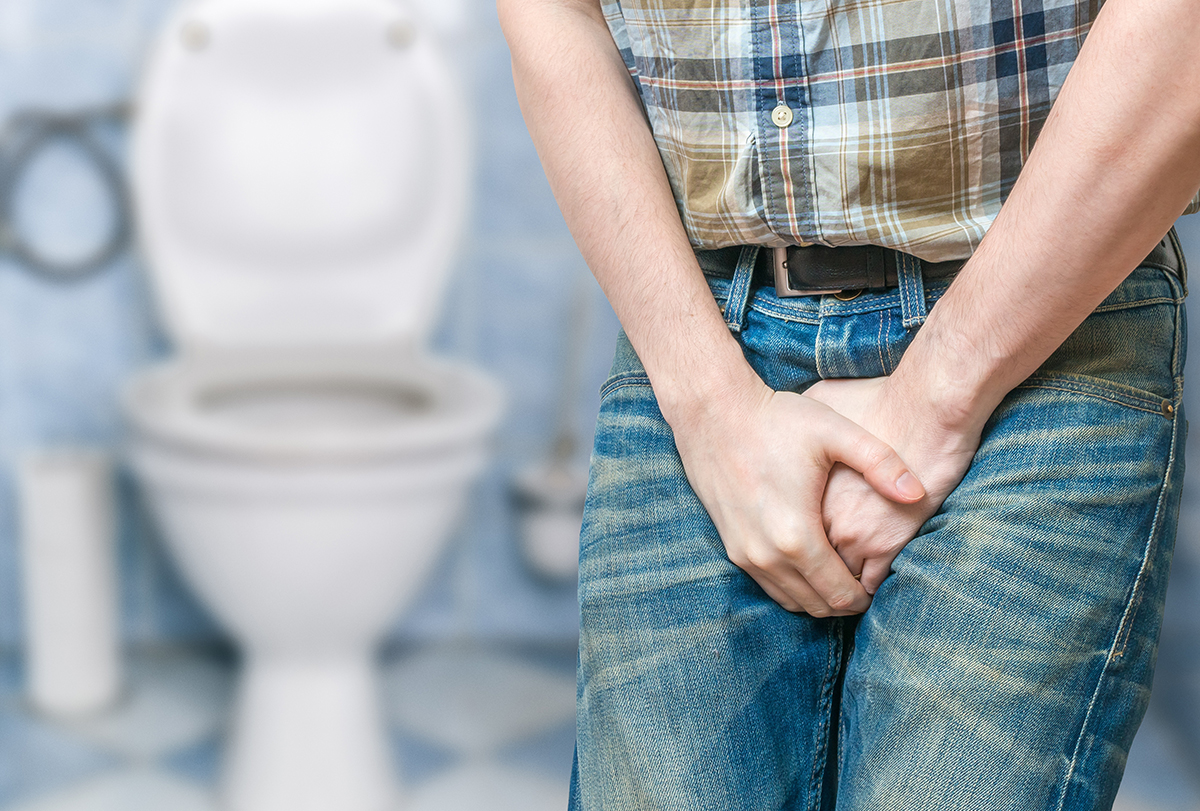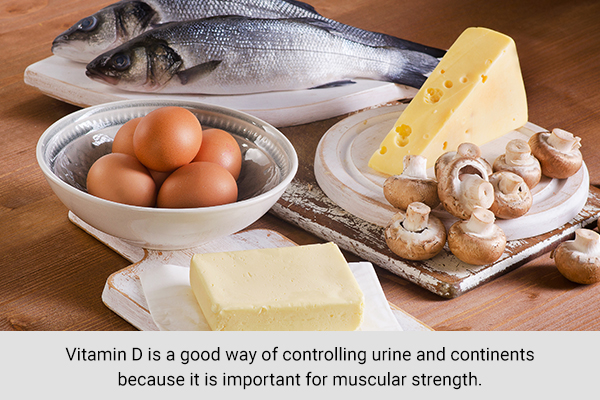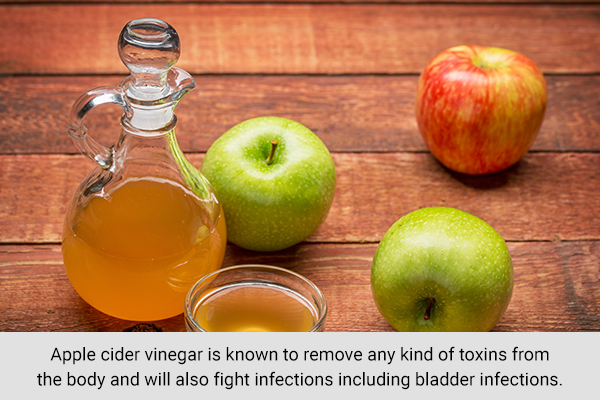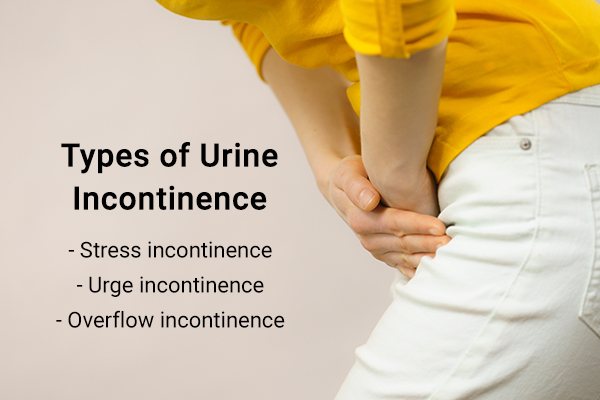In this article:
Urinary incontinence is characterized by an involuntary leakage of urine or uncontrolled urination. It basically means that you may urinate even when you do not want to.

In simple terms, your control over the urinary sphincter either gets completely lost or becomes slightly weak.
Urinary incontinence is a pretty well-known condition that affects many people. Given below are some natural ways to manage urinary incontinence.
Ways to Manage Urinary Incontinence
Here are some ways to manage urinary incontinence.
1. Ensure adequate magnesium intake
Magnesium is a good remedy for treating urinary incontinence, especially if you are deficient in magnesium. Magnesium is an element that is responsible for relaxing the muscles in your body.
Having enough magnesium is important for reducing spasms of the bladder muscles and ensuring complete emptying of the bladder. Magnesium supplements work by reducing bladder muscle spasms and enabling the bladder to fully empty upon urination. (1)
Include magnesium-rich foods in your diet, which include:
- Nuts
- Bananas
- Seeds
- Yogurt
Only take magnesium supplements after consulting your doctor.
2. Check your vitamin D levels

Vitamin D is a good way of controlling urinary incontinence because it is important for muscular strength. It also lowers your risk of pelvic floor disorders.
Pelvic floor disorders are conditions affecting the proper function of a woman’s pelvic organs. These conditions include prolapse or sagging of the organs, or problems with bladder and bowel function. (2)
The best way to get vitamin D is via sunlight exposure in the early morning, but you can also consume vitamin D-rich foods, such as
- Fish
- Eggs
- Oysters
- Dairy products
Only take vitamin D supplements after consulting a medical professional.
3. Try using these herbs
The following herbal remedies may provide relief from urinary incontinence.
a. Gosha-Jinki-Gan
Gosha-jinki-gan is a traditional Japanese therapeutic agent that is composed of 10 crude traditional Japanese medicinal herbs and has been known to be efficacious and beneficial for an overactive bladder. (3)
Studies have shown that this herb can lower nighttime and frequent urination. Most of these studies employed a dose in the range of 4.5 to 7.5 g/day. Studies have suggested that gosha-jinki-gan may be a potential therapeutic agent for an overactive bladder.
It can be purchased easily from herbal pharmacies and shops where it is available as capsules.
However, a study suggested possible adverse effects of using this herbal medicine, which include diarrhea and nausea. If you experience either of these, you may need to talk to a doctor first before continuing its use. (4)
b. Try buchu
Agathosma betulina (previously Barosma betulina), aka buchu, is a tonic that is very good for your urinary tract health. It is beneficial for those who suffer from urinary incontinence because it offers anti-bacterial and diuretic properties. It also helps in strengthening the tissues in the urinary tract.
It is important to note that if you are suffering from pain or any other sign of inflammation in your urinary tract, you should avoid using herbal remedies without a doctor’s consultation. (5)
4. Take apple cider vinegar

Apple cider vinegar is amazing for overall health. It is known to remove toxins from the body and fight infections, including bladder infections. (6)
Having excess weight can be a contributing factor to urinary incontinence; apple cider vinegar is a good remedy as it helps you lose weight.
It is important to note that you should not take apple cider vinegar if you have a hyperactive bladder.
5. Implement bladder training and scheduling
Bladder training aims at learning to schedule and delay urination, so that every time you get the urge to urinate, you can learn how to hold it off. Start by delaying it for a few minutes such as 10 minutes, and then later on lengthen the time between your toilet trips.
You have to slowly train your bladder and limit your toilet trips to once every 2–4 hours. The best way to train your bladder is ensuring complete voiding by waiting a few minutes after urinating and then trying again to empty your bladder completely.
The purpose of this exercise is for you to go to the toilet according to the clock and not according to your need to go. (7)
6. Practice yoga

Yoga can help tighten the muscles that are responsible for controlling the center of your urethra. Moreover, mental health issues such as anxiety, which may arise from urinary incontinence, can be controlled by practicing yoga regularly. (8)
Yoga poses that can work well for urinary incontinence include:
- Triangle pose
- Chair pose
- Squat pose
7. Practice meditation
Meditation is helpful for giving you control over your body, which can be beneficial for overcoming urinary incontinence. Meditation and breathing exercises can help control the bladder and thereby reduce the episodes of sudden urination. (9)
8. Perform Kegel exercises

Kegel exercises were first described by Arnold Kegel and are performed for pelvic floor muscle strengthening. These exercises can also strengthen the abdominal muscles that help control urination.
Performing Kegel exercises is easy. All you have to do is pull in your pelvic muscles and hold for around 3 seconds. Relax for a little while and do the same again. Repetitions of 10–15 exercises are sufficient when done thrice a day. (10)
Types of Urinary Incontinence
Urinary incontinence can be of different types: (11)

- Stress incontinence – Performing vigorous physical activity can put some pressure on the bladder and cause a release of urine. You may have experienced this when you laugh loudly, jump, or sneeze.
- Urge incontinence – If you have an overactive bladder, you can have an intense urge to urinate that is hard to control, leading to a sudden loss of urine.
- Overflow incontinence – Sometimes, a person is unable to completely empty their bladder, because of which they may experience dribbling of urine every now and then.
Factors That Can Lead to Urinary Incontinence
Urinary continence depends on various factors including good bladder capacity, normal mobility, normal bladder sensation, and normal brain function so that the person is aware of when it is acceptable to empty the bladder.
On the other side, urinary incontinence can be due to many reasons, which include: (12)
- Age
- Menopause
- Overactive bladder
- Urinary stone
- UTIs
- Weak pelvic floor muscles
- Prostate enlargement
- Nervous damage
- Constipation
- Certain foods and medications
Medical Causes of Urinary Incontinence
- People with a reduced bladder capacity due to health issues such as fibrosis from tuberculosis or cystitis (inflammation of the bladder, usually caused by a bladder infection) can develop urinary incontinence. (13)
- Inadequate or incomplete bladder emptying is normally accompanied by urinary incontinence. (13)
- Weakening of the sphincter due to prolonged labor or any damage to the sphincter after prostatectomy (14) or neurogenic bladder dysfunction can lead to urinary incontinence. (15)
- Congenital reasons such as epispadias may also cause sphincter weakness. Epispadias is a rare birth defect located at the opening of the urethra. In this condition, the urethra does not develop into a full tube, and the urine exits the body from an abnormal location). (16)
- In men, benign prostatic hypertrophy (BPH), prostate gland enlargement, urethral stricture, or hypertrophy of the bladder neck (a group of muscles that connect the bladder to the urethra) can be blamed for urinary incontinence. (17)
- Genuine stress incontinence (GSI) and fistulas due to prolonged labor can be culprits for urinary incontinence in women. Such women commonly have many kids. (18)
- Idiopathic detrusor instability, Alzheimer’s disease, (19) and Parkinson’s disease (20) also cause urinary incontinence.
Dietary and Lifestyle Interventions to Manage Urinary Incontinence
Here are some tips for managing urinary incontinence: (17)(11)
- Consume a fiber-rich diet. A diet deficient in fiber can cause constipation, which will put you at an increased risk of urinary incontinence.
- Stay hydrated and drink a sufficient amount of water every day.
- Manage and maintain your weight healthily.
- Exercise daily as exercising is also a very good way of managing urinary incontinence.
- Quit smoking because smoking daily can put you at risk of developing a hyperactive bladder.
- Avoid alcohol and caffeine, which can also be bad for an overactive bladder.
When to See a Doctor
If urinary incontinence is very frequent and starts to affect your quality of life, it’s important to seek medical advice.
Most-Asked Questions About Urinary Incontinence
Why is urinary incontinence worrisome?
Urinary incontinence can cause a lot of discomfort to the person suffering from it. Sudden loss of urine can also be very embarrassing in a public setting for the affected person.
Moreover, having urine left in the bladder due to incomplete emptying can sometimes cause growth of bacteria, which can lead to infections.
Does acupuncture help with urinary incontinence?
Acupuncture is helpful in controlling urinary incontinence because it helps strengthen your urinary system. It also improves your ability to hold in urine, because of which sudden urge to urinate may become less frequent.
Although some information about acupuncture is available, more studies are needed on the topic. It is important to note that acupuncture should only be done by a professional. (21)
Final Word
Urinary incontinence can be embarrassing for many people to discuss but it is important to know that this problem may need medical assistance for proper management and thus, you should not feel any shame.
If even after trying the available remedies, your situation does not improve, you should seek professional help.
- Was this article helpful?
- YES, THANKS!NOT REALLY


